Overview
In today’s digital landscape, reputation marketing is not just important; it is essential for both businesses and individuals. We understand that trust, credibility, and career opportunities can feel elusive, but effectively managing your online presence can change that. By focusing on positive feedback and engaging strategically, you can increase your visibility and revenue. This, in turn, can enhance your professional prospects and lead to greater financial stability. Remember, you are not alone in this journey, and there are empowering solutions available to help you take ownership of your career.
Introduction
In today’s fast-paced business environment, reputation marketing has become a vital strategy that goes beyond traditional branding. We understand that as consumers increasingly depend on online reviews and social media to guide their choices, cultivating a positive online presence is more critical than ever. For those of you navigating career transitions, grasping the nuances of effective reputation marketing can truly unlock new opportunities and build credibility in a competitive job market.
Have you ever felt overwhelmed by the sheer volume of online information? You’re not alone. By harnessing the power of customer feedback and actively managing your digital footprint, you can enhance your visibility and significantly influence your career path. As the digital landscape continues to evolve, mastering reputation marketing is essential for both businesses and individuals like you who are seeking to thrive in an interconnected marketplace.
Imagine the possibilities that await when you take charge of your online reputation. By embracing this strategy, you not only position yourself for success but also empower yourself to navigate the complexities of career transitions with confidence. Remember, you have the ability to shape your narrative—let’s explore how together.
Defining Reputation Marketing: A Key Component of Modern Business
Reputation marketing is not just a strategy; it’s a lifeline that emphasizes promoting a brand or individual through the power of positive feedback and public perception. In our digital age, where a staggering 75% of internet users find it challenging to differentiate between authentic feedback and fake reviews, it’s essential for businesses to harness brand marketing as a vital tool for building trust and credibility.
For those of you considering a career change, grasping the nuances of marketing your image is crucial. It can significantly impact your job search and professional branding. The emotional and practical benefits of income growth are profound; when your digital presence shines, it opens doors to greater job opportunities and financial stability. Many job transitioners face the frustration of unfair or disproportionate salaries, making it even more important to enhance your digital presence.
Did you know that companies addressing at least 25% of their digital feedback see a remarkable 35% increase in revenue? This statistic highlights the critical role of interaction in building a positive reputation. As Parnell Woodard, a Career Ownership Coach, wisely states, “Understanding how to manage your digital presence is crucial for anyone looking to shift into a new profession.” This knowledge can be the key difference between being overlooked and standing out in a competitive job market.
Moreover, with 87% of shoppers engaging in comparative buying across various channels, the influence of online evaluations on consumer confidence is undeniable. This reality underscores the necessity for job transitioners to actively manage their digital reputation, as potential employers often research candidates online before making hiring decisions. High ratings and consistent business information across review platforms are essential for achieving visibility in top local search results.
A compelling case study revealed that businesses that enhanced their digital presence and encouraged location-specific reviews saw significant improvements in their local search rankings. This strategy is one that job changers can adopt to boost their visibility.
Defining brand marketing in 2025 means recognizing its essential components: proactive management of online feedback, strategic use of testimonials, and effective social media engagement. As the landscape evolves, experts emphasize that reputation marketing is more than just damage control; it’s a proactive strategy that can greatly enhance your visibility and appeal in a competitive job market. Understanding these dynamics is vital for anyone looking to reinvent their professional life, achieve their career goals, and ultimately attain financial independence, as detailed in ‘Your Career Revolution.’ Furthermore, recognizing and leveraging your transferable skills can empower you to navigate your job search with confidence. Remember, you are not alone in this journey; we understand the challenges you face, and we are here to support you every step of the way.
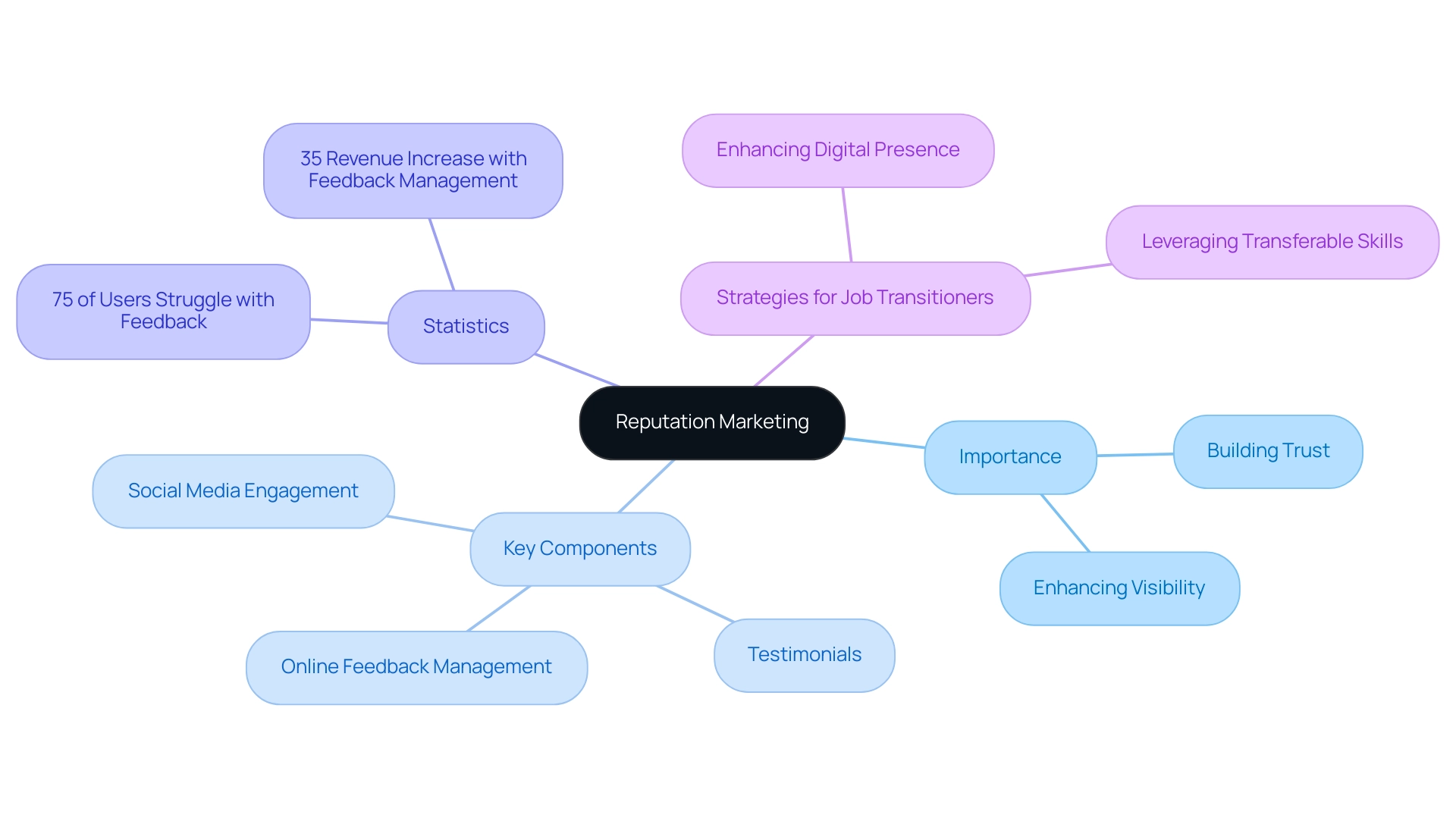
Why Reputation Marketing Matters More Than Ever
In today’s digital landscape, reputation marketing is more important than ever, shaped by the powerful influence of online feedback and social media. Did you know that around 90% of consumers read reviews before making a purchase? Even more striking, 88% trust these reviews as much as personal recommendations. This trend highlights how essential reputation marketing is for maintaining a positive online presence. With nearly two-thirds of Facebook users engaging with local business pages weekly, it’s clear that social platforms play a significant role in shaping consumer perceptions.
For those navigating job transitions, particularly in a challenging employment market, building a strong personal brand through effective visibility marketing can significantly enhance marketability and open doors to new opportunities. As discussed in ‘Your Career Revolution,’ taking charge of your professional future is crucial, especially when striving for advancement. The Entrepreneur’s Source exemplifies this by helping clients facing professional uncertainties to recognize their transferable skills and pursue financial independence through personalized coaching and support.
A solid reputation in marketing not only fosters customer loyalty but also boosts engagement rates. Studies reveal that customers are willing to spend up to 31% more on products with exceptional reviews. Conversely, a staggering 86% of consumers hesitate to buy from businesses that lack strong reputation marketing. This underscores the importance of taking personal agency in managing your reputation, which is vital for achieving success in today’s competitive landscape.
As both organizations and individuals face increased scrutiny, managing reputation marketing has become a crucial component in navigating professional transitions. Looking ahead to 2025, the importance of branding in the digital age cannot be overstated; it is a key tool for building credibility and trust through reputation marketing, ultimately influencing both consumer behavior and professional growth. Remember, you are not alone in this journey—taking proactive steps can lead to a fulfilling and successful career.
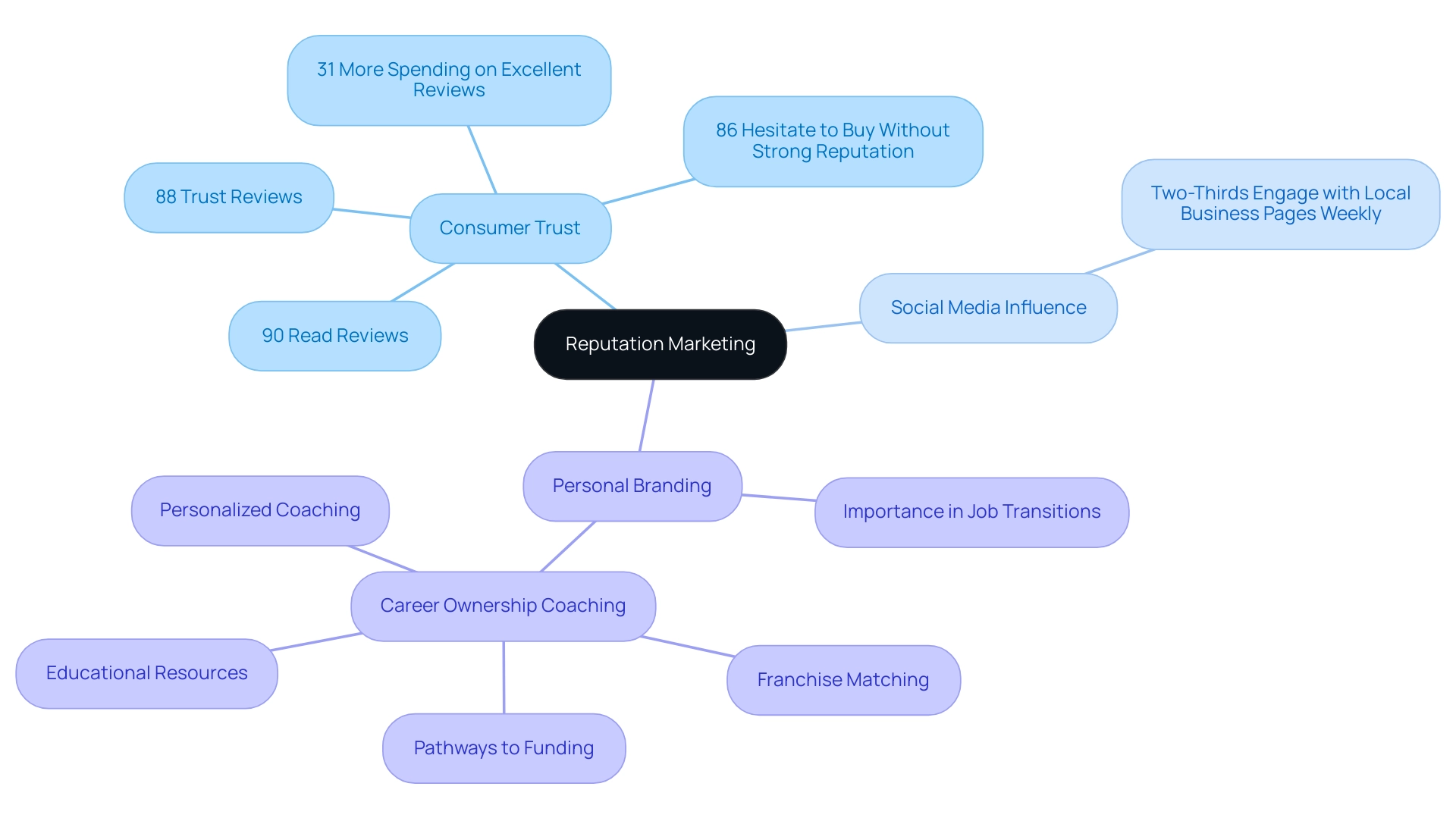
The Benefits of Reputation Marketing for Businesses and Career Transitioners
Reputation marketing offers numerous benefits, such as enhanced brand visibility, greater customer trust, and better sales performance. For businesses, a positive image is crucial; it can lead to higher conversion rates and enhanced customer retention. In the context of professional transitions, effectively handling one’s image can significantly enhance job prospects and create valuable networking opportunities.
We understand that standing out in a competitive job market can feel daunting. By actively showcasing positive experiences and feedback, individuals can make themselves more attractive to potential employers. Moreover, a robust reputation can ease transitions into new industries or roles, establishing credibility and trustworthiness. This is especially significant in a declining job market where conventional professional options are limited, and the urgency to take control of one’s path is paramount.
Did you know that the first five seconds of page load time can dramatically affect conversion rates? A staggering 32% of visitors abandon a site if load time extends from one to three seconds. This emphasizes the significance of a well-managed digital presence, where every detail contributes to the overall perception.
As Kent Campbell, chief strategist for Reputation X, wisely notes, “Managing your online presence is crucial for anyone aiming to progress in their profession.” This shapes how potential employers perceive you and can make a significant difference in your job search. This sentiment resonates with insights from ‘Your Career Revolution,’ highlighting the need for urgency in career advancement and the importance of navigating employability challenges.
Consider the effectiveness of using reputation marketing. Companies can expand their reach and strengthen customer trust through reputation marketing by enhancing their visibility on popular rating platforms like Google, Yelp, and Facebook. The case study titled “Harnessing Popular Review Sites” illustrates that different review platforms attract varied audiences, necessitating tailored engagement strategies.
This customized engagement strategy not only improves visibility but also cultivates a positive image that can be enhanced through reputation marketing by transitioners seeking to establish themselves in new fields. Ultimately, overseeing one’s image is not solely about personal branding; it is a strategic approach that can result in significant professional progress and opportunities, especially in attaining financial independence and lifestyle satisfaction.
Furthermore, with 60% of global LinkedIn users aged between 25 and 34, it is essential for job transitioners to uphold a robust online presence that appeals to this demographic. Discover Your Profession 2.0 | Professional Ownership Coach Parnell Woodard sets itself apart with a thorough and customized method to vocational guidance, providing free services and an organized process that aligns well with the principles of marketing credibility. This connection highlights the significance of image management in attaining professional objectives and navigating transitions effectively.
As you contemplate your next steps, consider questions such as how long you will be employable, the transferability of your skills, and how effective management of your public image can contribute to income growth, thereby enhancing your financial security. Remember, you are not alone in this journey, and taking proactive steps can lead to a fulfilling and successful career transition.
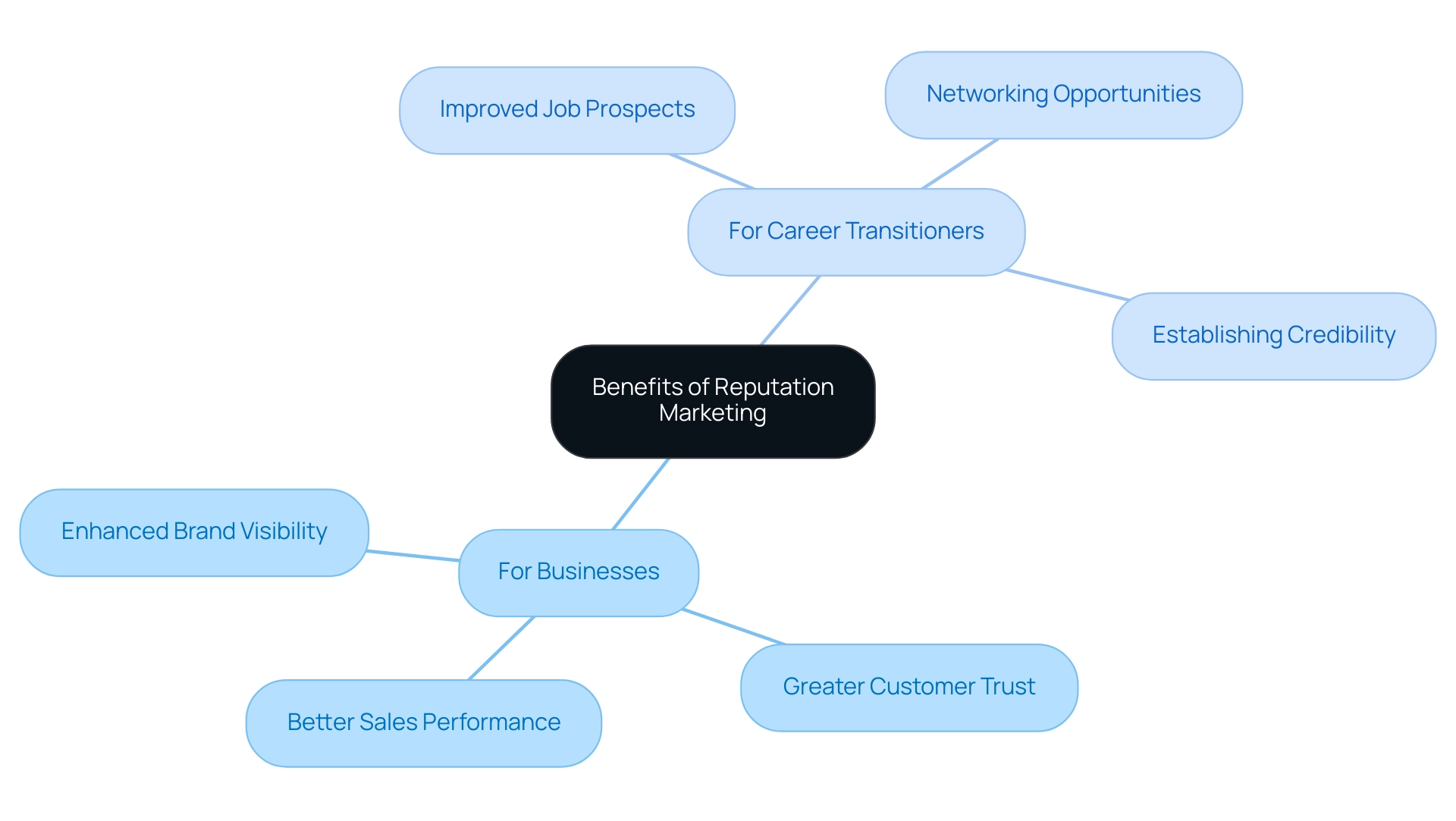
Implementing a Successful Reputation Marketing Strategy
To effectively execute a reputation marketing plan, it’s essential for both companies and individuals to start by understanding their current online standing. This begins with a thorough examination of feedback and social media sentiment. We understand that assessing key metrics—like the number of evaluations and overall ratings—is crucial, especially since 60% of consumers filter their searches by ratings above four stars. Setting clear objectives, such as increasing positive reviews or enhancing engagement on social media, becomes a guiding light for your efforts.
Engaging with customers through personalized responses to feedback, whether positive or negative, can significantly enhance your reputation marketing. Research shows that personalized interactions foster a sense of community and trust, leading to higher engagement rates. Additionally, utilizing social media platforms to share success stories and testimonials can amplify positive narratives, showcasing the true value of customer experiences.
As Parnell Woodard, an Ownership Coach, emphasizes, “Transitioning to ownership requires not only skill but also a strong personal brand that reflects your professional journey.” For those navigating job changes, actively managing your digital presence is essential. Curating a professional image that highlights your transferable skills and achievements can create a compelling personal brand that attracts potential employers.
By leveraging platforms like LinkedIn—where 86% of B2B organizations focus their marketing efforts—you can effectively connect with industry professionals and showcase your expertise.
Moreover, case studies reveal that businesses engaging in reputation marketing on platforms like Google, Yelp, and Facebook have successfully broadened their reach and reinforced customer trust. Tailoring your engagement strategies to fit the unique audiences of different platforms is vital for maximizing your impact. Importantly, Wikipedia shows up on the first page of Google search results at least 60% of the time, highlighting the necessity of a robust digital presence in search engine rankings.
As we look ahead to 2025, the landscape of image marketing will continue to evolve. These best practices will be crucial in managing the complexities of online presence, ultimately supporting job transitions toward financial independence and personal autonomy. Remember, you are not alone in this journey; with the right strategies, you can navigate these challenges successfully.
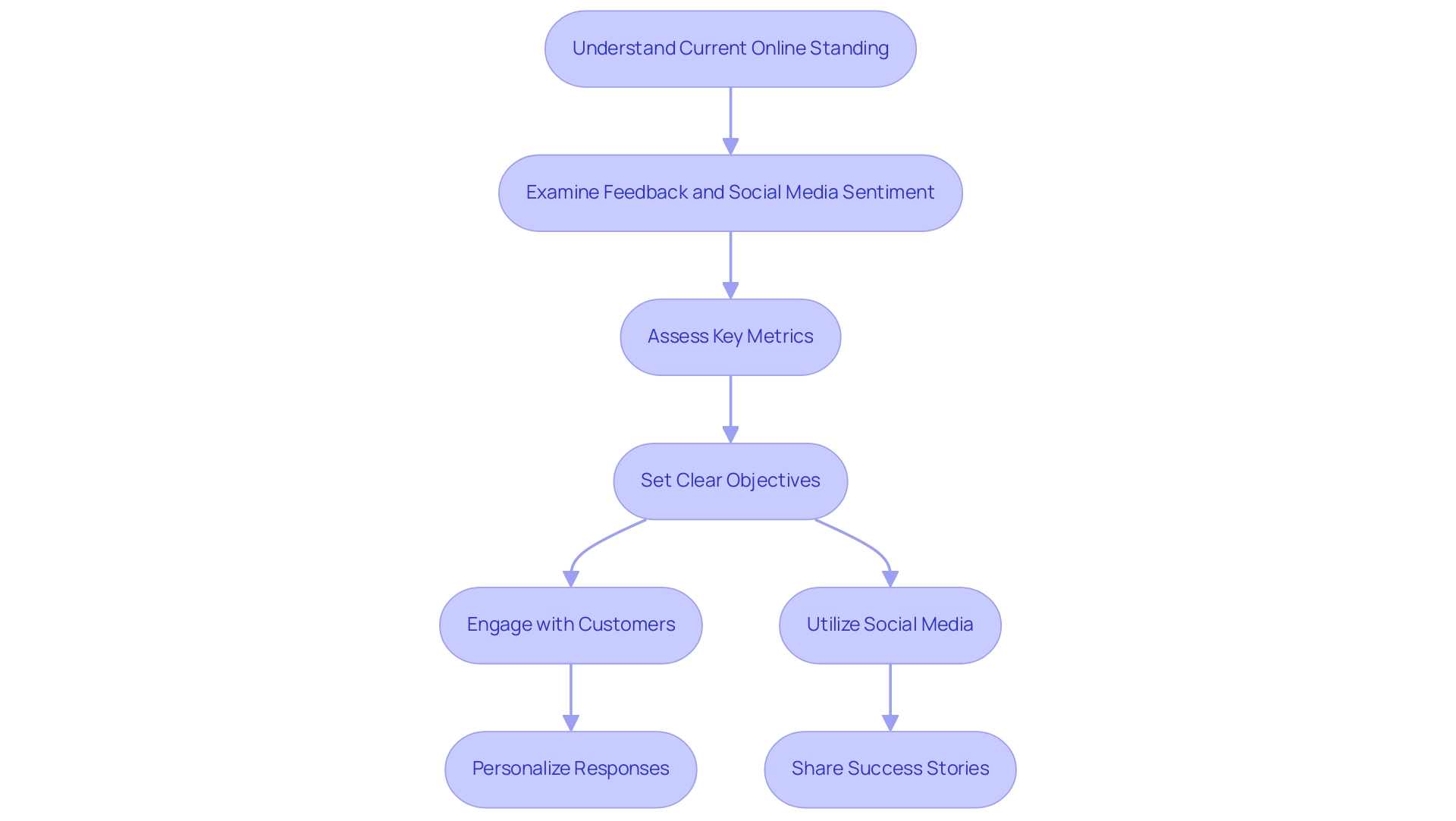
Navigating Challenges in Reputation Marketing: Common Questions Answered
For individuals in transition, especially those new to the digital landscape, navigating the complexities of reputation marketing can feel overwhelming. We understand that key concerns often revolve around effectively responding to negative evaluations, soliciting positive feedback, and maintaining a consistent brand image across various platforms. Constructive engagement with negative feedback is essential; viewing it as an opportunity for growth rather than a setback can lead to improved customer relations and brand perception. This is crucial for those seeking to establish themselves in a new career path.
Statistics indicate that responding to negative feedback promptly—ideally within 24 hours—can significantly mitigate their impact and demonstrate a commitment to customer satisfaction. In fact, it is recommended to respond to Facebook comments within this timeframe to enhance engagement. Furthermore, motivating pleased customers to share their positive experiences can be effectively accomplished through follow-up communications and strategic incentives. These strategies have been shown to increase both the quantity and quality of feedback.
Krunal Vaghasiya, a marketing technology specialist, shares that ‘trustworthy assessments are important because they build consumer confidence, enhance business credibility, influence purchasing choices, provide honest feedback, and prevent the spread of misleading information.’ Maintaining a consistent and authentic digital presence across platforms is crucial for building trust and credibility, particularly for those navigating career transitions. Companies that refine their digital feedback not only boost their local search standings but also augment their overall visibility.
Google’s algorithm assesses both the quantity and quality of reviews, making it essential for businesses to actively manage their digital standing. For those changing professions, understanding these challenges and developing effective strategies to address them can significantly enhance their professional prospects.
By utilizing reputation marketing strategies, individuals can create a positive online presence that highlights their skills and values, ultimately leading to enhanced opportunities in their professional journey. This approach aligns with the principles outlined in ‘Your Career 2.0: A Survival Guide for The Battered Career Syndrome and Investor Syndrome’ by Find Your Career 2.0 | Career Ownership Coach Parnell Woodard. It empowers individuals to take control of their destiny and achieve financial independence in a changing job market.
Additionally, addressing age factor limitations and the need for financial freedom can further support career transitioners in mitigating risks and fast-tracking their new careers.
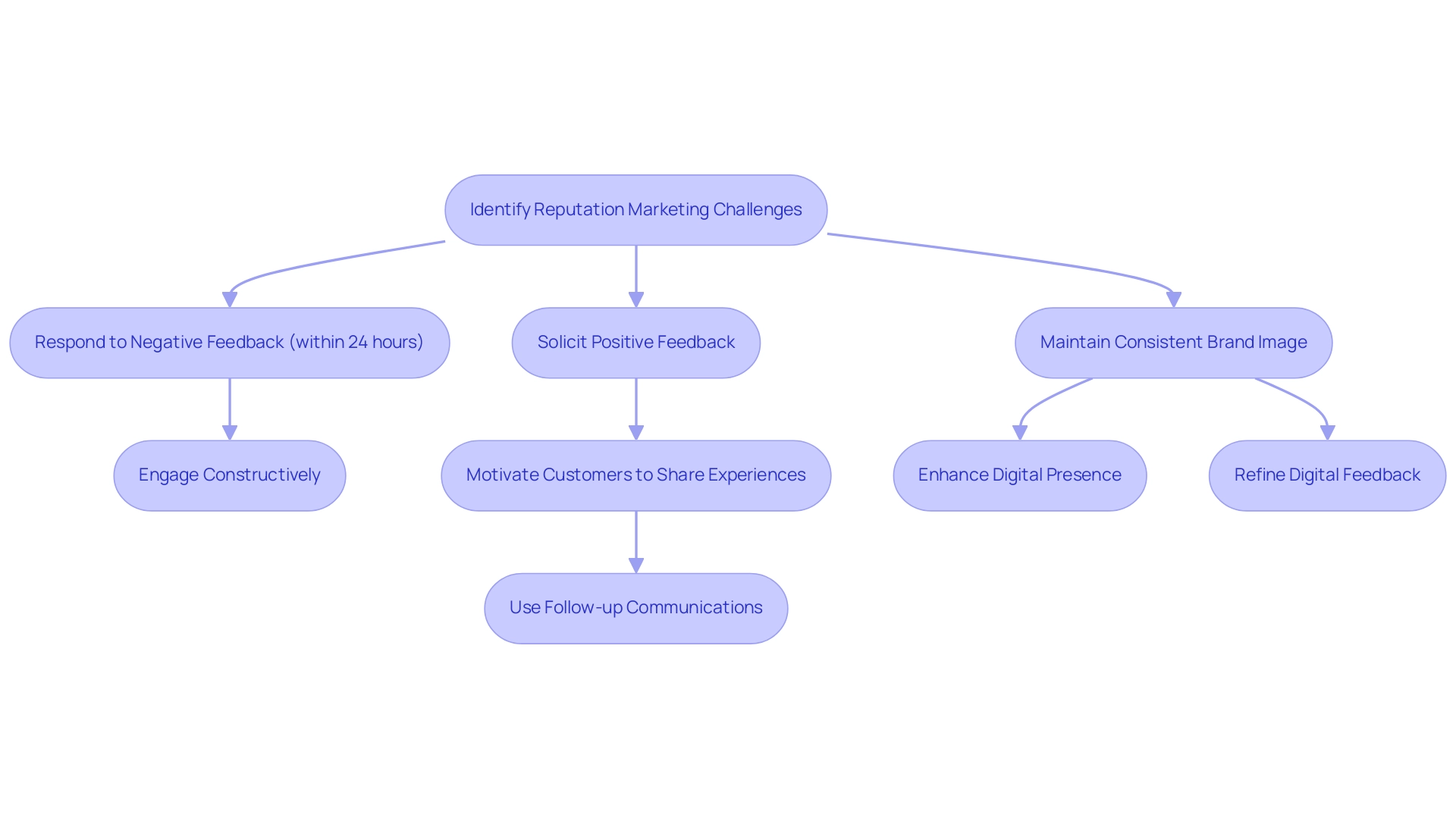
Conclusion
In today’s digital age, we understand that navigating career transitions can feel overwhelming. Reputation marketing has emerged as an indispensable strategy for both businesses and individuals seeking to enhance their visibility and marketability. By actively managing online feedback, soliciting positive reviews, and engaging with social media, you can significantly improve your prospects in a competitive job landscape. With nearly 90% of consumers relying on online reviews to guide their purchasing decisions, establishing a strong online presence is essential for your success.
The benefits of reputation marketing go beyond just visibility; they foster increased trust, improved job prospects, and the potential for higher income. For those of you transitioning careers, a robust personal brand can open doors to valuable networking opportunities and ease your shift into new industries. As various case studies highlight, both businesses and individuals can leverage reputation marketing to craft compelling narratives that resonate with their target audiences, ultimately building credibility and trust.
Implementing an effective reputation marketing strategy means continuously assessing and engaging with online platforms. By constructively addressing negative feedback and promoting positive customer experiences, you can shape your professional narrative and enhance your online image. As the landscape of reputation marketing evolves, mastering these techniques will empower you to take control of your professional journey and achieve your goals. Embracing reputation marketing is not just about managing perceptions; it’s about seizing opportunities and paving the way for a successful future. Remember, you are not alone in this journey, and with the right strategies, you can thrive.


